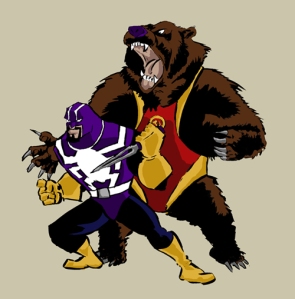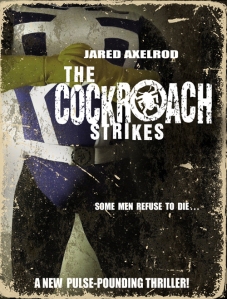(This is part “Three Questions With Xxxx”. If you’re interested in taking part click here and fill out the form.)
 I’ve had the pleasure of knowing Jared for a few years through his works and having met him at Balticon. He’s easily one of the most multi-talented people I know. Costumer, puppeteer, writer, visual artist, journalist, model, and voice actor cover just a few of his roles.
I’ve had the pleasure of knowing Jared for a few years through his works and having met him at Balticon. He’s easily one of the most multi-talented people I know. Costumer, puppeteer, writer, visual artist, journalist, model, and voice actor cover just a few of his roles.
 1) You are a multi-talented creator. You’ve created podcasts, short fiction, awesome costume pieces, and graphic novels. It seems like you’ve woven all of those things together to form the narrative around and behind the character of Comrade Cockroach, a retired Russian super villain. What drove you to tell his story?
1) You are a multi-talented creator. You’ve created podcasts, short fiction, awesome costume pieces, and graphic novels. It seems like you’ve woven all of those things together to form the narrative around and behind the character of Comrade Cockroach, a retired Russian super villain. What drove you to tell his story?
Neil Gaiman. Honestly.
Y’see, DC Comics hired Gaiman to write “Whatever Happened to the Caped Crusader?” the “last” Batman story. The idea was it was going to be similar to Alan Moore’s “Whatever Happened to the Man of Tomorrow?” “last” Superman story. Just as Moore focused on Superman’s capability to inspire, Gaiman was tasked with finding the essence of Batman. While Gaiman’s story is beautiful in so many ways, he can’t quite nail the dismount. The essence of Batman, according to Gaiman, is that he doesn’t give up.
Which to my mind is ridiculous. OF COURSE he doesn’t give up. He’s had, what, one defeat? Two? (the death of the 2nd Robin and that time Bane broke his back, for those following along at home) Compare that to the countless victories he’s had. Why would he give up, if all he’s known is success?
(I get what Gaiman was aiming for, that appeal of Batman is not in his success, but in his struggles, but that’s not really what’s presented in the story.)
Which, contrarian that I am, sent me thinking about the kind of person for who the statement “they never give up” WOULD mean something. Obviously, it would be a supervillian, for whom failure is a way of life. And from that rude clay, Comrade Cockroach was born.
 2) One of the pieces of advice I often hear is “write what you know”. I think that advice, as it’s commonly understood, is more than just a little ridiculous. As a creator, you strike me as the kind of person who, if they don’t know something, will do whatever it takes to find it out in order to tell the story. What skills and knowledge did you acquire in order to bring this character to life?
2) One of the pieces of advice I often hear is “write what you know”. I think that advice, as it’s commonly understood, is more than just a little ridiculous. As a creator, you strike me as the kind of person who, if they don’t know something, will do whatever it takes to find it out in order to tell the story. What skills and knowledge did you acquire in order to bring this character to life?
Very little that I didn’t have already, I’m sorry to say. Comrade Cockroach has always been a love-letter to all the pop-culture elements I love. He crawls on walls like Spider-Man and heals from any wound like Wolverine. He costume purposely evokes a Luchadore outfit. He’s Russian, like so many Captain America villains of my youth. Comrade Cockroach is all of these things because I love all of these things. Any research involved happened long before I thought him up.
Take the Russian element, for example. I’m of Russian descent myself—my ancestors, Mensheviks, every last one of them, left for America once it became clear they were on the losing side. Part of me is curious, I suppose, about what they missed by coming over here to lead far better lives then they ever would have had they stayed. The USSR under Stalin was this weird sort of history gift that keeps on giving; it’s fascism, make no mistake, but it’s fascism that grew up with the Nazis, so it’s desperate not to make the same mistakes. So you have things like giving medals to mothers for raising their children, and encouraging literacy, and the beautiful hubris of the space program, but also the gulags and airbrushing people out of photographs, and the immense corruption. Trying to make a better world and going about it in the worst possible way. All of that, all of the kaleidoscope of conflicting ideals, that is irresistible to me.
Comrade Cockroach is not so much a reason to research, but rather, a release valve for all the research I’ve got pent up inside.
 3) Most people, when they write stories, chose to tell the hero’s tale. With the good Comrade, we’re getting a decidedly non-heroic story. What were the challenges for you in that?
3) Most people, when they write stories, chose to tell the hero’s tale. With the good Comrade, we’re getting a decidedly non-heroic story. What were the challenges for you in that?
I guess it all depends on your definition of heroism, doesn’t it? Comrade Cockroach does think of himself as heroic, and he carries himself that way because of it.
What makes him fun is that sense of purpose, of heroism, is put in the service of goals that are usually petty, sometimes monstrous. Cockroach believes that the ends justify the means, but he is also guilty of over-inflating his ends. His primary goal is to destroy the American superhero the Bold Eagle, and in his mind, this is an epic quest, the kind you write operas about. Nevermind the regime that gave him this order is no longer around, and the current government wants nothing to do with him. Nevermind that the Bold Eagle who patrols the streets now is literally a different man than the one Cockroach was ordered to kill. And even if those things weren’t true, it would still be murder with the flimsiest of motives.
The nice thing about Cockroach is that he’s not a crazy person. He does regret the things he has done. And this regret, I believe, is the key to the character. He knows he’s done bad things, and he doesn’t even have the salve of success to tell him that he was right to do them.
Cockroach is a tortured everyman in the vein of —if I’m allowed to be so lofty—Arthur Miller’s Willy Loman. He has a job he’s not sure he believes in, for a goal that seems more uncertain by the day. But he doesn’t know how to do anything else. For all his power, he doesn’t have the strength to be anybody other than what he is. Because then everything he’s sacrificed up into this point would truly be for naught.
What’s weird is that all of these elements of who Comrade Cockroach is have come together from various small, short pieces. None of them have everything that is Cockroach in them, but all have contributed a piece. One of the fascinating things to me about this character has been watching him evolve as each layer of story has been put upon him.
But to get back to your question, because of the world he lives in, Cockroach must always lose. So the challenge with his stories is to make the plot come to a triumphant conclusion, but at a horrible cost to Cockroach personally. It’s not by accident that THE COCKROACH STRIKES ends with Comrade Cockroach figuring out what was going on, but at the cost of one of his few friends and his own sense of identity.
Comrade Cockroach must always lose. But he never gives up.
You can find Jared at http://www.jaredaxelrod.com/
Follow him on Twitter at PlanetX